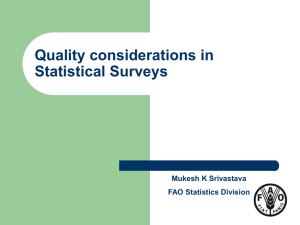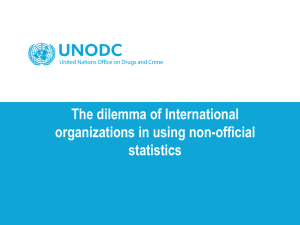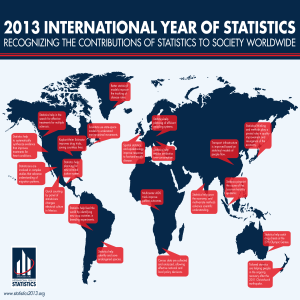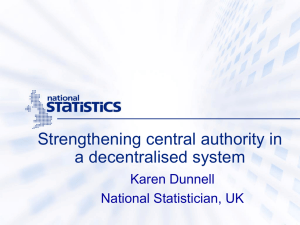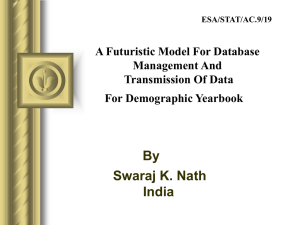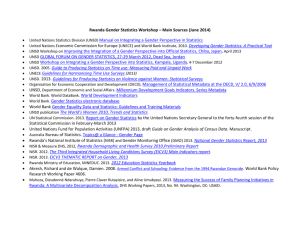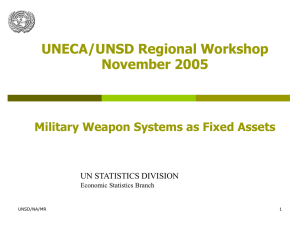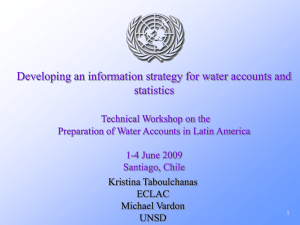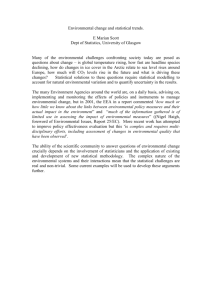National Statistical Systems
advertisement
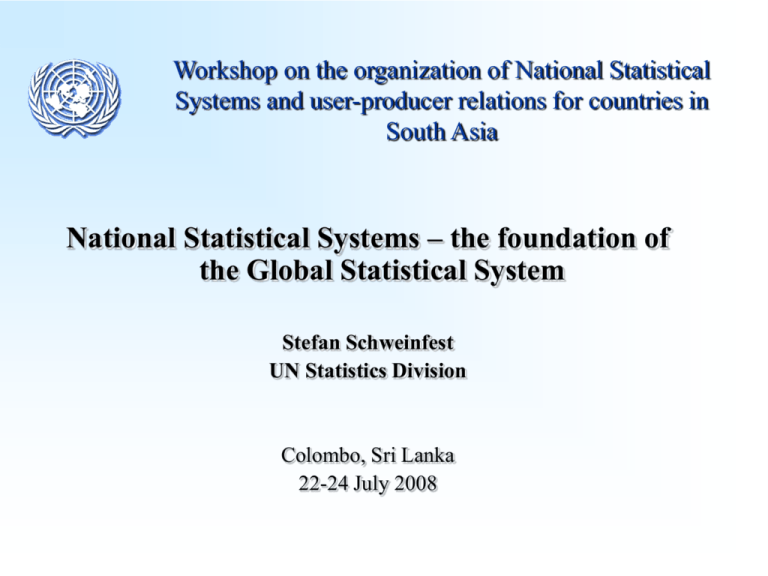
Workshop on the organization of National Statistical Systems and user-producer relations for countries in South Asia National Statistical Systems – the foundation of the Global Statistical System Stefan Schweinfest UN Statistics Division Colombo, Sri Lanka 22-24 July 2008 Structure of presentation Driving forces for a Global Statistical System Elements of the Global Statistical System Global Statistical System in action National Statistical Systems as foundation of the Global Statistical System Future challenges Driving forces for a Global Statistical System Globalization of the demand for statistics International organizations (UN Development agenda) Private sector Academia IT revolution “Division of labour” Global Statistical System??? Global ? - as opposed to ‘international’ Statistical ? - official statistics only System ? - or federation, network, mess Elements of the Global Statistical System National Statistical Systems International intergovernmental bodies (e.g. UNSC, CES, Labour Statisticians) International statistical offices (e.g. UNSD, ECE, ILO etc.) International statistical associations UN - Elements of the Global Statistical System UN Statistical Commission Committee for the Coordination of Statistical Activities UN Statistics Division UN Statistical Commission History/Mandate: Started in 1946 Small (24 members) and technical Promoting development of national statistics and improvement of comparability Coordination of statistical work of specialized agencies Development of statistical services of UN secretariat Advising UN system on statistical matters Promoting improvement of statistics and statistical methods generally Committee for the Coordination of Statistical Activities (CCSA) Since 1966 – reconstituted in 2002; Meetings twice a year Participation of over 20 Chief Statisticians (UN System as well as World Bank, IMF, OECD, Regional Development Banks, Eurostat). “Promote coordination, integration and complementarity among the statistical programmes of the international organizations..” Principles governing international statistical activities UN Statistics Division to develop and promote global statistical standards to collect, analyse and disseminate social, economic, political and environment statistical data to assist Member States to establish a functioning statistical system to coordinate and promote global statistical activities and enhance the functioning of the UN Statistical Commission to support DESA in its multidimensional programme of work on social and economic affairs Global Statistical System in action Developing statistical standards Compiling and disseminating global data Technical cooperation Global Statistical System in action - Standards Concise Oxford Dictionary: STANDARD “weight or measure to which others conform or by which the accuracy or quality of others is judged; thing serving as basis of comparison” Develop “common professional language”. Global Statistical System in action – Standards Challenges: Need for an integrated presentation of the family of standards Differentiate normative degrees: Standards, Principles, Recommendations, Manuals etc. Ensure full legitimacy of global standards (Statistical Commission). Assist countries in the implementation of standards Assess degree of compliance with global standards Global Statistical System in action • Make UN databases freely available • Organize international databases to allow searchability and open access • Promote national data dissemination • Build a global data dissemination infrastructure Global Statistical System in action – Technical cooperation Multitude of bilateral and multilateral projects of cooperation reflect the shared vision of the Global Statistical System and a sense of professional solidarity; Context of reduced funding: coordination and pooling of resources becomes all the more imperative. Improve the level of coordination, through (i) early harmonization of submissions for projects, (ii) common approach to evaluation of technical cooperation and training activities (iii) sharing of training and other technical cooperation material. National Statistical Systems as foundation of the Global Statistical System Many different types of national systems: Decentralized vs. centralized high visibility and unique identity vs. part of larger organization No single “best practice” model for statistical governance Statistical systems reflect individual country circumstances (historical and cultural) Common characteristics of successful and effective statistical systems: Credibility, Influence, Responsiveness and Innovativeness. National Statistical Systems as foundation of the Global Statistical System (2) “Credibility and trust is hard to win, but easy to lose” Internal: Quality assessment process Methodological soundness Professional integrity External: International certification and peer reviews Complying with international standards Quality assurance programme National Statistical Systems as foundation of the Global Statistical System (Tools) Fundamental Principles Adopted by the UN Statistical Commission in 1994 challenge of the implementation. Handbook of Statistical Organization (2003) Topics: statistical law, council, chief statistician, coordination, resource management (financial, human, IT); user communications National Statistical Systems as foundation of the Global Statistical System (Tools) UNSD Website of good practices Handbook (revision 4) evolving Future challenges Governance of the global statistical system (effectiveness, coherence, technical focus) Better support for the implementation of global standards – ensure compliance How to tackle new areas? Organization of an effective global “data traffic” (consistent, transparent, fast) Better framework for effective technical cooperation at all levels Development of a comprehensive strategic plan for the Global Statistical System? Thank you! http://unstats.un.org
